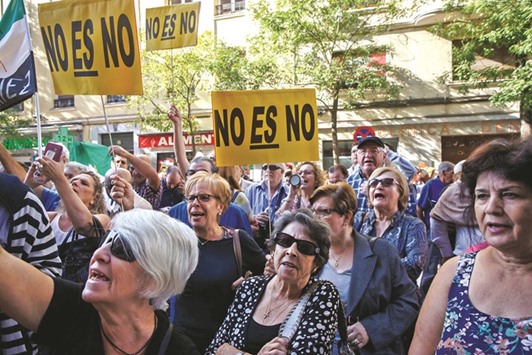The leader of Spain’s Socialist party, Pedro Sanchez, resigned yesterday after losing a party assembly vote, a step which could pave the way for the formation of a new government and end a nine-month political deadlock.
Sanchez has led a long stand-off with acting Prime Minister Mariano Rajoy’s conservative People’s Party (PP), which won the most votes but fell short of a majority in two inconclusive elections, and the dispute has frustrated attempts to form a government.
The party’s members had met yesterday to decide whether to open up a leadership race in October, as proposed by Sanchez, or oust him, after the Socialist leadership tore itself in two this week.
“I have always believed that the socialist party had to provide an alternative, unfortunately it has not been possible... I offer my resignation. It has been an honour,” Sanchez told fellow party members after losing the vote, according to a source from his entourage.
By ousting Sanchez, who has presided over a slump in the party’s support, the Socialists rebels hope to find ways to avoid another election, including a potential abstention in a confidence vote on allowing Rajoy a second term.
If no government is formed before the end of October, a third election will be called in December.
The roughly 300 members of the party’s federal committee had been summoned to Socialist headquarters in Madrid for a showdown between allies of Sanchez and opponents who want him out.
With feelings running high, the meeting yesterday started late and the committee then agreed to go into recess to determine the parameters of the debate and if there would be a vote after it, El Pais reported on its website, which was providing a blow-by-blow account as some 150 party members demanded a chance to speak.
By mid-afternoon, there had been three adjournments with no inkling of a breakthrough.
“Tough moments (but) I don’t want to lose hope,” tweeted Pepe Martinez Olmos, a senator who professed that he “loved” his party.
Since December 2015, the country has been without a fully-functioning executive as rivals fail to agree on a government following two elections in which none of the main parties won an absolute majority.
Even Rajoy was forced into negotiating a minority government which was voted down in parliament earlier this month.
On Friday Sanchez made his first public appearance since senior party members tried to oust him on Wednesday.
His face was sombre as he predicted the committee would face a “decisive debate”.
The Socialist Party (PSOE) has been wracked for months by internal dissent, and tensions boiled over into open warfare after 17 members of the party’s 35-strong executive quit together in a bid to force Sanchez out.
The ill-feeling was evident again earlier yesterday as Sanchez supporters shouted “no means no, no means no” in showing their backing for his continued opposition to a Rajoy-led administration.
Dozens of PSOE members backing Sanchez were out bright and early at party headquarters to roundly boo his opponents, decrying them as “putschists” and “fascists” as they showed up for the meeting.
Sanchez detractors want the PSOE to use the 85 parliamentary seats it won in June polls to help unblock the national deadlock and allow Rajoy to lead a right-wing government by abstaining in a vote of confidence, rather than voting against as it did earlier this month.
The PSOE’s place is “in the opposition”, said Socialist lawmaker Eduardo Madina, who opposes Sanchez.
Sanchez opposes another Rajoy term, pointing to repeated corruption scandals hitting the PP and inequalities sparked by years of austerity.
“Spain doesn’t deserve another four years of Mariano Rajoy at the head of the Spanish government – four more years with a prime minister who has systematically lied to Spanish society,” he said on Friday.
With Sanchez’s resignation, an interim leadership will be appointed which would likely direct the Socialists to abstain if Rajoy decided to go for another vote of confidence, thus unblocking the situation and avoiding a third round of elections.
Spain’s parliament has until October 31 to produce a government or new elections will be called in December – the third in a year.

Supporters of Sanchez gathering outside the PSOE headquarters in Madrid, before the announcement of his resignation.
